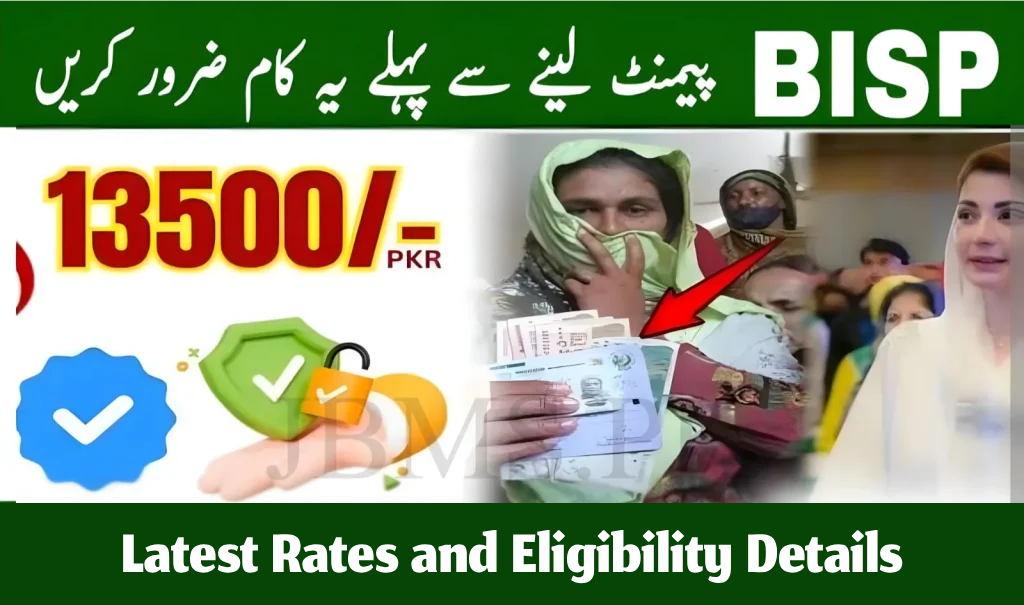
The Benazir Income Support Programme (BISP) provides crucial financial aid to low-income families in Pakistan. In 2025, the program offers quarterly payments to eligible recipients, directly addressing the challenges posed by rising inflation and economic difficulties.
The payment amount under BISP in 2025 is Rs. 13,500 per quarter, distributed in installments to qualifying households. This structured support helps families manage basic living expenses more effectively throughout the year.
Recipients can verify their eligibility and payment status through the official 8171 portal or via SMS, ensuring transparency and ease of access. The program remains a key social safety net, supporting millions with timely financial assistance.
Benazir Income Support Programme 2025 Payment Details
The Benazir Income Support Programme (BISP) provides financial aid to eligible low-income families in Pakistan. The payments are set in fixed amounts and distributed quarterly, based on clearly defined eligibility criteria.
Latest Payment Amounts
In 2025, each eligible beneficiary receives Rs. 13,500 every three months. This amount represents the quarterly payment and helps families meet essential expenses.
The government plans to increase this payment to Rs. 14,500 per quarter starting in 2026. This adjustment is part of ongoing efforts to support beneficiaries amid changing economic conditions.
Payments are typically broken down into installments, with Rs. 4,500 disbursed every month over the quarter.
Disbursement Schedule
BISP payments are made quarterly, in four installments per year. Each quarter, beneficiaries receive their total Rs. 13,500 payment in three parts of Rs. 4,500 each.
Disbursement is carried out through mobile financial services like JazzCash and Easypaisa, as well as traditional bank transfers. Beneficiaries can track their payments via official online portals or SMS services.
The schedule ensures consistent financial support every three months, reducing the risk of long gaps without assistance.
Eligibility Requirements
Eligibility focuses on low-income families, primarily women, who meet specific socioeconomic criteria set by BISP. Registration involves submitting a CNIC and passing a means test.
The programme targets households struggling to cover basic needs including food, healthcare, and education. Verification is done through the BISP 8171 system, which allows beneficiaries to check their status online.
Periodic updates ensure that only qualified applicants continue to receive payments, maintaining the accuracy of the support system.
Methods and Process for Receiving Payments
Recipients of the Benazir Income Support Programme (BISP) 2025 can receive payments through secure and verified channels. The process requires verification of eligibility, followed by payment collection via approved options. Issues related to accessibility or eligibility status can occur and have defined solutions.
Official Disbursement Channels
Payments are distributed using multiple official channels to ensure ease and security. Beneficiaries may withdraw funds from designated banks, ATMs, mobile banking apps, or authorized cash points near their location. The programme uses digital verification to reduce fraud and ensure timely payments.
Banks commonly involved include major national banks that partner with BISP. Mobile wallets and apps supported by the government are also popular for faster, less physical contact transactions. The use of these channels reduces third-party interference, ensuring direct delivery to eligible recipients.
Verification Procedures
Verification starts with confirming the beneficiary’s CNIC (Computerized National Identity Card) through official BISP portals or authorized service points. Monthly or quarterly digital checks verify eligibility before payment issuance.
Applicants are required to register their information accurately and regularly update any changes to avoid payment disruptions. Beneficiaries can check payment status online or via SMS services provided by BISP, confirming the amount and date of disbursement.
Common Payment Issues
Common issues include ineligibility due to incorrect documentation or outdated information. Some families may be temporarily suspended if they fail repeated verification checks or if data mismatches occur during CNIC validation.
Delays in payment can arise from technical glitches or banks’ operational constraints. In such cases, beneficiaries are advised to contact BISP helplines or visit nearest payment centers to resolve discrepancies. Awareness of procedural requirements helps avoid most issues.